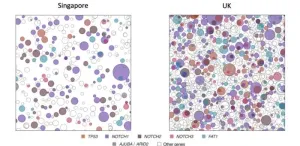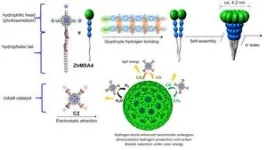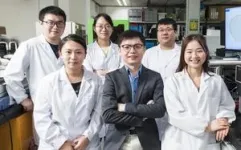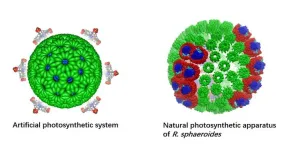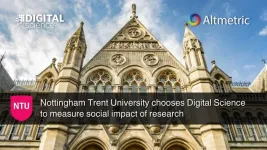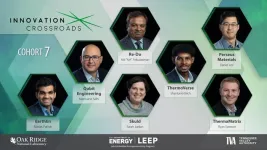A new study has shown how, on average, people in the UK have facial skin that is far more DNA damaged from the sun than people in Singapore, explaining the far higher risk of developing the most common skin cancers in the UK.
This study looked at keratinocyte cancers - basal and squamous cell carcinomas - rather than melanoma, a rarer and sometimes fatal form of skin cancer, finding Northern European skin types in the UK were less able to protect themselves from UV damage.
Researchers from the Wellcome Sanger Institute and their collaborators at the Skin Research Institute of Singapore (SRIS) compared the mutational landscape of normal facial skin between individuals from the UK and Singapore.
They show that Northern European skin types in the UK* have four times the burden of DNA mutations than the average skin type found in Singapore. These new insights help to explain why so many in the UK go on to develop keratinocyte skin cancers, despite there being lower levels of UV light - the cancers’ primary risk factor – in the UK.
The team found that most of the DNA mutations accumulated in Northern European skin types in the UK are due to UV light whereas in Singapore mutations are mainly due to usual ageing processes.
There are around 156,000 cases of keratinocyte skin cancer a year in the UK**. It includes basal cell and squamous cell carcinoma, and is the most common type of skin cancer worldwide*** despite being underreported. The global incidence of keratinocyte skin cancer varies widely §, but is related to a person’s lifetime exposure to ultraviolet (UV) radiation. Sources of UV radiation include sunlight and tanning beds.
Singapore sits near the equator with a much higher typical UV level than the UK – the average UK UV index is 3, Singapore’s is 8. Rates of keratinocyte cancers are 17 times higher in the UK, even though the cancer’s primary risk factor, UV light, is three times stronger in Singapore.
The findings, published today (3 August) in Nature Genetics, help shed light on the differences in cancer risk between populations. The study shows the importance of looking at high and low cancer incidence populations to capture insights into how cancer evolves, the genetic basis of skin cancer susceptibility, and mechanisms which may protect against cancer. This understanding may help in developing personalised approaches to sun protection and skin cancer prevention.
In the new study, scientists set out to uncover the reasons behind the differences in keratinocyte skin cancer incidence and the normal skin landscape between the UK and Singapore populations. Estimating lifetime exposure to UV is very difficult, particularly as it involves quantifying social behaviour spanning decades, so researchers explored differences in genetics.
Researchers from the Wellcome Sanger Institute and their collaborators collected tissue samples from patients undergoing routine surgery to remove excess eyelid or eyebrow skin. The team sequenced the outermost layer of skin to identify genetic alterations, focusing on 74 genes commonly mutated in cancers. They analysed over 400 samples and compared tissue from five donors in Singapore with published sequencing data from six UK donors. Mean donor age from Singapore was 62 years old while UK mean age was 68.
Eyelid skin in the UK cohort had accumulated four times as many cancer-associated DNA mutations, particularly those affecting known ‘cancer genes’ such as TP53. Cells with these mutations out-compete other cells and are more likely to divide. 15% of UK skin cells had damage to the p53 protein, a common feature of skin cancer, compared to just 5% of Singaporean skin cells. The scientists also detected an abnormal number of chromosomes in 13% of cells in UK skin, compared to just 1% of cells in Singapore. Scientists found that by 60 years of age, nearly every cell in the UK donor skin had a mutation in a cancer-associated gene.
The scientists next compared the germline genetics of the UK and Singaporean donors. Germline genetics refers to inherited DNA, passed on from parents. Differences were found between the two populations in genes that produce pigmentation, which is known to protect cells against UV light, but also in genes related to inflammation, the immune system and some skin cancer genes. Together, these inherited differences affect the skin’s ability to protect itself from UV light as we age.
The ‘less protective’ Northern European skin type observed in the UK germline outweighs the fact that the UK has a far lower ground-level exposure to UV light than in Singapore. The researchers suggest inherited variations in skin-protective genes therefore play a vital role in shaping how our skin ages and responds to sunlight.
Overall, the study shows the importance of looking at normal human tissues from high and low cancer incidence populations to capture, where possible, how germline genetics, the environment and human behaviour interact to bring about variable cancer outcomes.
Dr Charlotte King, first author of the study and postdoctoral scientist at the Wellcome Sanger Institute, said: “These findings help us understand why the UK has such a high incidence of keratinocyte skin cancers. We hope our study encourages others to look at further diverse populations – across the spectrum of cancer risk – for clues on how we can better prevent this common cancer. Pigmentation in the skin can protect cells from UV rays, but other differences, like how the body copes with inflammation, may explain variation in cancer risk from person to person. Studying populations at a lower cancer risk can teach us about protective mechanisms that already exist in nature.”
Dr Phil Jones, senior author of the study, senior group leader at the Wellcome Sanger Institute, professor of cancer development at the University of Cambridge and consultant at Addenbrooke’s Hospital in Cambridge, said: “I treat these skin cancers every week. Our study shows that people in the UK lack the genes that protect our skin against the sun. Making sure we remember sun-safe behaviours, such as wearing protective clothing, using sunscreen, and seeking shade during peak UV hours is incredibly important for all, but as this study shows, especially for some genetically high-risk populations.”
ENDS
Contact details:
Jelena Pupavac
Press Office
Wellcome Sanger Institute
Cambridge, CB10 1SA
Email: press.office@sanger.ac.uk
Notes to Editors:
* For UK sample donor demographics, please refer to the publication.
** Non-melanoma skin cancer statistics in the UK can be accessed at https://www.cancerresearchuk.org/health-professional/cancer-statistics/statistics-by-cancer-type/non-melanoma-skin-cancer/incidence
*** K. Urban, R.L. Giesey, G.R. Delost, et al. (2021) ‘The global burden of skin cancer: A longitudinal analysis from the Global Burden of Disease Study, 1990–2017.’ Journal of the American Academy of Dermatology. DOI: 10.1016/j.jdin.2020.10.013.
§ Sung, H. et al. (2021) ‘Global Cancer Statistics 2020: GLOBOCAN Estimates of Incidence and Mortality Worldwide for 36 Cancers in 185 Countries.’ A Cancer Journal for Clinicians. DOI: 10.3322/caac.21660.
Publication:
C. King, B. Lane, P.H. Jones et al. (2023) ‘Somatic mutations in facial skin from countries of contrasting skin cancer risk.' Nature Genetics. DOI: 10.1038/s41588-023-01468-x.
Funding:
This research was supported by Wellcome and Cancer Research UK. For full funding acknowledgements, please refer to the publication.
Selected websites:
University of Cambridge
The mission of the University of Cambridge is to contribute to society through the pursuit of education, learning and research at the highest international levels of excellence. To date, 110 affiliates of the University have won the Nobel Prize. Founded in 1209, the University comprises 31 autonomous Colleges and 150 departments, faculties and institutions. Cambridge is a global university. Its 19,000 student body includes 3,700 international students from 120 countries. Cambridge researchers collaborate with colleagues worldwide, and the University has established larger-scale partnerships in Asia, Africa and America. The University sits at the heart of the ‘Cambridge cluster’, which employs more than 61,000 people and has in excess of £15 billion in turnover generated annually by the 5,000 knowledge-intensive firms in and around the city. The city publishes 316 patents per 100,000 residents. www.cam.ac.uk
The Wellcome Sanger Institute
The Wellcome Sanger Institute is a world leading genomics research centre. We undertake large-scale research that forms the foundations of knowledge in biology and medicine. We are open and collaborative; our data, results, tools and technologies are shared across the globe to advance science. Our ambition is vast – we take on projects that are not possible anywhere else. We use the power of genome sequencing to understand and harness the information in DNA. Funded by Wellcome, we have the freedom and support to push the boundaries of genomics. Our findings are used to improve health and to understand life on Earth. Find out more at www.sanger.ac.uk or follow us on Twitter, Facebook, LinkedIn and on our Blog.
About Wellcome
Wellcome supports science to solve the urgent health challenges facing everyone. We support discovery research into life, health and wellbeing, and we’re taking on three worldwide health challenges: mental health, infectious disease and climate and health. https://wellcome.org/
END
